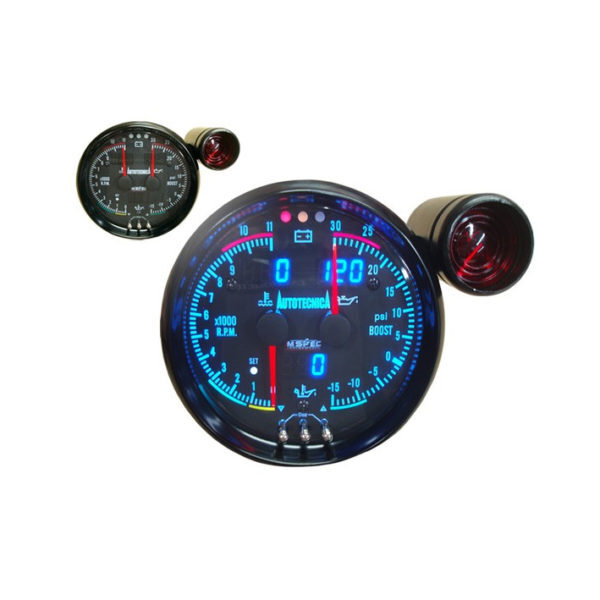Comprehensive Overview to Recognizing and Making Use Of a Tachometer Efficiently
Opening the Keys of Tachometers: Whatever You Need to Know About This Vital Tool in Your Lorry
Comprehending the ins and outs of tachometers can supply important insights right into your car's performance and upkeep demands. From determining engine speed to deciphering the information it provides, tachometers serve as an essential tool for vehicle proprietors and fanatics alike. By deciphering the secrets behind this vital tool, you can unlock a riches of information that can boost your driving experience and guarantee the longevity of your lorry.
Relevance of Tachometers
The importance of tachometers lies in their ability to give important real-time data regarding an engine's rotational speed, enabling for accurate surveillance and maintenance of equipment. By measuring the changes per minute (RPM) of an engine's crankshaft, tachometers supply useful insights into the engine's efficiency - tachometer. This data is crucial for guaranteeing that the engine runs within its optimal variety, avoiding prospective damages from over-revving or underperforming
Tachometers play an important role in aiding drivers and specialists identify any abnormalities in the engine's rate, which could suggest concerns such as fuel ineffectiveness, mechanical troubles, or excessive stress on the engine. By promptly determining these problems via tachometer readings, maintenance can be done proactively, protecting against costly repair services and downtime in the lengthy run.
Moreover, tachometers are especially vital in high-performance cars and equipment, where specific control over engine rate is necessary for optimal operation. Racing cars and trucks, airplane, and commercial tools rely on tachometers to deliver peak performance while preserving security requirements. In significance, tachometers are not simply tools for gauging rate yet crucial devices for ensuring the smooth and efficient operation of engines across various applications.
Just How Tachometers Measure Engine Rate
Making use of sensing units that spot the regularity of electric pulses generated by the engine's ignition system, tachometers properly determine the rotational speed of an engine. By monitoring the price at which these pulses are received, tachometers provide real-time comments on just how quickly the engine's crankshaft is revolving per minute, commonly described as revolutions per min (RPM)
The tachometer's sensor, often linked to the engine's ignition coil or stimulate plug wires, grabs the electrical signals generated each time a cylinder fires. These signals are after that exchanged RPM analyses displayed on the scale or tool cluster within the vehicle driver's sight. Tachometers can be analog or digital, with contemporary lorries frequently including digital screens for precise and immediate RPM analyses.
This information is critical for chauffeurs to comprehend the engine's efficiency, avoid over-revving, maximize gear moving, and make certain efficient fuel usage. By properly measuring engine speed, tachometers play an essential function in aiding drivers operate their lorries safely and effectively.
Translating Tachometer Analyses
Having a clear understanding of how tachometers determine engine speed establishes the structure for properly interpreting the RPM readings showed. Translating tachometer analyses is essential for optimum vehicle performance and engine health and wellness. RPM (Transformations Per Min) analyses on the tachometer suggest the rate at which the engine's crankshaft is revolving. When the engine is idling, the tachometer needle commonly rests around 600-1000 RPM, depending on the vehicle. As you accelerate, the RPM will enhance, mirroring the engine's higher rotational rate. When changing equipments in a hands-on transmission automobile, the RPM will certainly go down as you engage the clutch and modification her explanation gears, then rise once again as you increase in the brand-new gear. Keeping an eye on the tachometer can assist you figure out one of the most effective shifting points to optimize gas economic climate and engine power. Furthermore, unusual changes or continually high RPM analyses might indicate potential concerns with the engine that might need professional attention. By taking note of the tachometer analyses and comprehending how to analyze them, you can guarantee your lorry runs smoothly and efficiently.


Tips for Making Use Of Tachometers Effectively
To enhance driving efficiency and enhance engine performance, what trick strategies can be applied for efficiently utilizing tachometers? Tachometers are vital devices that offer real-time feedback on engine rate, making it possible for vehicle drivers to make informed choices for far better performance - tachometer. Below are some tips for utilizing tachometers effectively:
Comprehending Optimum RPM Range: Familiarize on your own with the optimum RPM (Revolutions Per Minute) range for your automobile. This array varies between various cars and is typically shown in the proprietor's manual. Keeping the engine within this variety can enhance gas efficiency and prolong the engine's life expectancy.
Moving Equipments at the Right Time: Make use of the tachometer to identify the best time to shift gears. Aim to shift equipments when the RPM gets to the ideal variety for the following equipment.
Keeping An Eye On Engine Stress: High RPMs for prolonged periods can stress the engine. Watch on the tachometer to stop over-revving, particularly during acceleration or when lugging hefty tons.
Tachometers and Car Maintenance
When considering car maintenance, tachometers play an important function in monitoring engine performance and identifying prospective concerns. Full Report Tachometers provide vital information on engine speed, enabling vehicle drivers and mechanics to make sure that the engine is operating within the suggested RPM range. Consistently checking the tachometer readings can assist determine troubles such as engine misfires, worn-out spark plugs, or problems with the gas distribution system. By taking notice of the tachometer, chauffeurs can stop too much strain on the engine, which can bring about expensive repairs down the line.
In enhancement to spotting possible issues, tachometers can likewise assist in optimizing fuel effectiveness. By maintaining the engine speed within the ideal range, motorists can improve their gas mileage and decrease gas intake. This not only benefits the motorist's pocketbook but likewise adds to ecological preservation by lowering hazardous discharges.
Verdict
